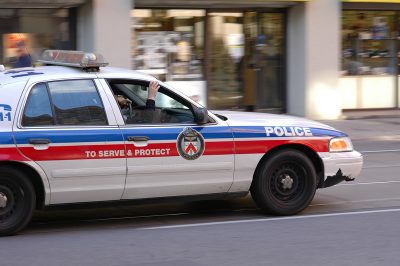HOW TO DEAL WITH POLICE IN CANADA

Police Quiz
Check your answers below.
1. Easy Question:
In Canada, the most important rule when having to deal with police is to be polite.
a) True b) False
2. Easy Question:
In Canada, it’s okay to argue with a police officer if you know they are wrong.
a) True b) False
3. More Difficult:
When driving, you must stop for the police even if you didn’t do anything wrong.
a) True b) False
4. More Difficult:
Bribing a police officer is
a) a common practice in Canada b) a guaranteed way to find yourself in prison
5. Difficult:
Can the police search your car?
a) Yes, it’s their legal right b) Yes, if you are drunk c) Yes, if they suspect you have illegal drugs
6. Difficult:
Can the police enter your home?
a) Yes, it’s their legal right b) Yes, if there was a 911 call c) Yes, if they have a warrant d) both b and c
Check your answers below.
How to Deal with Police in Canada
As a new immigrant, dealing with police in Canada is something you need to learn since all your knowledge comes from a different country. Here are some simple rules that will help you navigate the typical situations in your new home country.
Rule #1: Always be polite.
This is the most important rule you need to learn. Even if the police is doing something wrong and you know it, be polite. Obey the orders, don’t swear and don’t touch the officer. You can make your complaint later but at that moment you must be perfectly polite to avoid future trouble.
Rule #2: Know your rights.
When you know your rights, you will be able to notice if something was wrong and make a complaint later, for example when talking to your lawyer.
Rule #3: Always stop for the police if driving.
Driving is considered a privilege, not a right. If you are driving, the police have the legal right to stop you to check if you have been drinking alcohol, if your car is mechanically fit, to check if you have a valid licence and insurance. Even if you didn’t do anything wrong, you must stop.
Rule #4: Do not lie.
If you lie about your name or address, you may be charged with obstructing justice or obstructing the police.
Rule #5: Do not try to bribe a police officer.
While in some countries it’s a common practice, it Canada this is considered a crime to bribe any officer (police or government) and is punishable by imprisonment of up to 14 years .
What are my rights?
If you have been arrested:
You have the right to remain silent.
You have the right to speak to a lawyer.
Commonly Asked Questions
1. Can the police stop me?
Yes, the police can stop you if
– you are driving
– they suspect you have committed a crime
– if they see you committing a crime
2. Do I have to answer police officer’s questions?
Yes – if you have been involved in a car accident.
No – if you have been stopped in the street. But remember: you must be POLITE. If they ask for your name, address and identification, it’s better to show it to them.
3. What if I’m stopped by police while driving?
By law, you must show the police officer your driver’s licence, car registration and insurance.
4. Can the police check if I have been drinking alcohol?
Yes. They can do it at the road side or take you to the police station to do the test.
5. Can the police search my car?
Yes but only if they have reasonable and probable grounds to believe that there are illegal drugs or alcohol or evidence relating to a crime in the car. In other words, they must have a good reason.
If they stopped you to check if you have been drinking, check the mechanical condition of the car, or your licence and registration, they cannot search your car.
6. Can the police search me?
Yes but only if you have been arrested or if you have your consent (agreed) to it. It’s better not to agree to search until you have spoken to your lawyer. The police can also search you if they have a reason to believe you have illegal drugs, illegal alcohol or illegal weapon.
7. Can the police enter my home?
Yes if:
- they have a warrant (search warrant or arrest warrant)
- they have a permission from you or from someone else in authority in your home
- there was a 911 call made from your home and they believe that entry is necessary to prevent death or serious injury
- if they believe that someone in your home is in need of emergency services
- to help someone who has reported a domestic assault to safely remove their belongings
- if they believe there’s a drug laboratory in the home
For more detailed information on dealing with the police in Canada, please visit http://svan.ca/police-rights/
Read next:
Is Canada Really Multicultural?
Canadian Governments: is Canada one country or 13?
